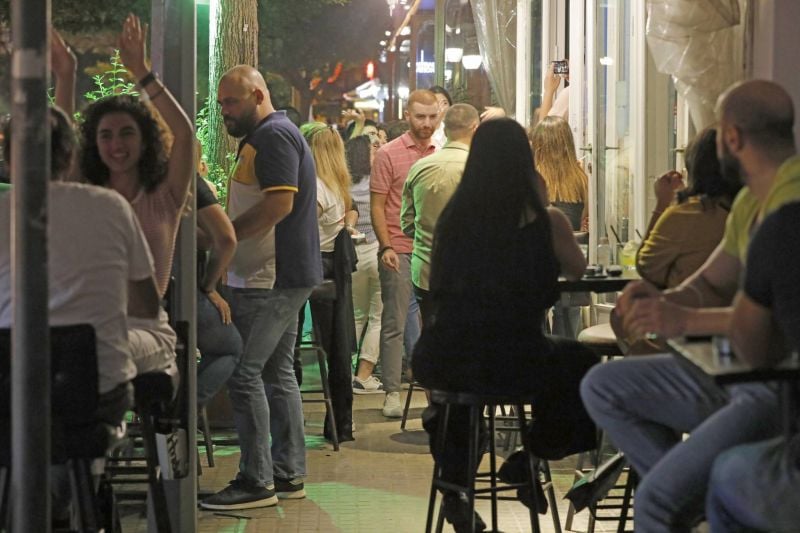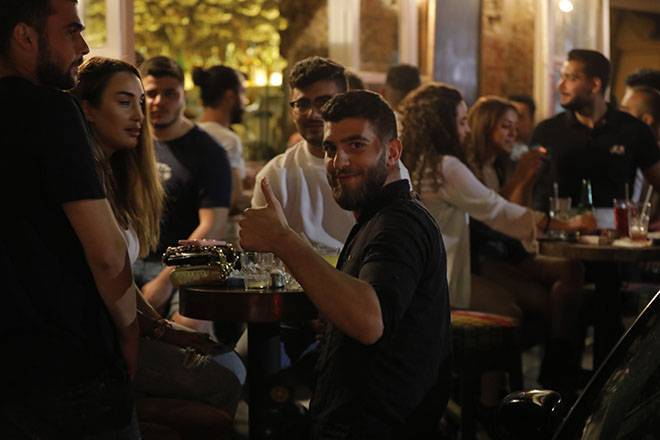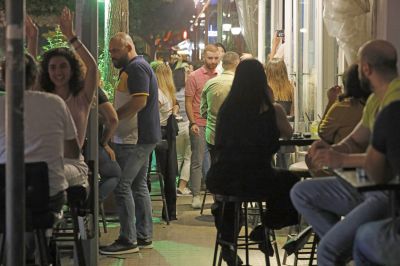
In Gemmayzeh, on May 24, the terrace of a bar is full. (Credit: Marc Fayad)
They were under rubble, deserted. They continue to be, but only to a certain extent. In the past few weeks, the old districts of Gemmayzeh and Mar Mikhael gave the impression, at least at first glance, that they had regained the unique atmosphere that was around prior to the tragic explosion at the port on Aug. 4 of last year.
Once night falls, pub music and car horns replace the never-ending drone of drills. Terraces are full, and bottles and cigarette butts are strewn all around.
“Finally! Now normal life is returning,” a valet parking attendant tells a young lady who has been waiting for her car for nearly 10 minutes.
There is almost appreciation for the traffic congestion at night. There are smiles at not finding an empty spot to park the car, while the valet attendants enjoy playing Tetris with the cars again. Passersby sneak into pubs to check whether they have any available tables, while others take out their phone to capture the moment for posterity. Most streets are either too bright or too dark. The districts are jam-packed.
But illusion has its limits. “I don’t have any money,” a youngster tells a kid selling roses. Above their heads, buildings are covered with tarps bearing the logos of associations leading the reconstruction work in the neighborhoods, and slogans such as “We are here to stay.”
In an alleyway off the main street of Gemmayzeh, a new resto pub opened just a few weeks ago. There are customers drinking outside as they wait for a table to be ready. Two young adults in their 20s are conversing. For the first time since the blast, Georgi is back in the neighborhood where he spent a decade.
“I toured the streets, but it’s not the same feeling anymore. It feels as if something has broken. People are laughing and drinking on the ruins of our city,” he says through clenched teeth.
“It looks like the situation is back to normal, but it's not. As we look at the destruction surrounding us, we get this feeling of guilt for being here,” his friend says as he surveys the heavily damaged floors of the building above the pub.
“People are mainly here during the weekend, presently,” says Maria, a waitress at another pub, whose surrounding buildings are still under reconstruction.
 For some young people, returning to the bars of Gemmayzeh is an act of resistance. (Credit: Marc Fayad)
For some young people, returning to the bars of Gemmayzeh is an act of resistance. (Credit: Marc Fayad)
‘Let us sleep!’
There is a group of young people standing in front of an alcoholic beverages stand. There is also a youngster drinking and smoking as he sits on his motorbike next to his friends.
Hassan, 23, visited Gemmayzeh a few days after the blast. “But it was too hard for me to stay. With everything going on in Lebanon right now, we need to let off some steam. All of our memories are here,” he says nostalgically.
Nour, 19, shares the same opinion. “That is not what a return to normal looks like. It is more like an act of resistance.” A few minutes later, she is sitting on another terrace, staring into the distance, eyes fixed on another building facade hidden by scaffolding.
“It is a coping mechanism that the Lebanese people are developing to protect themselves from breakdown, anxiety and depression, through ‘splitting’ and [continuing with their life],” says Marie-Thérèse Khair Badawi, a psychoanalyst and professor at St. Joseph University, referring to the psychological defense mechanism of those unable to reconcile the good in something with the bad. “They are aware, and at the same time, they are in denial of reality when it comes to satisfying the desire to live their life.”
A police car drives around to ensure that the 12:30 a.m. curfew is respected. But the district is never empty. “Let us sleep!” a resident shouts from his balcony.
Young people listen to the evening musician, beers in hand. Dave, the guitar player, has just broken up with his girlfriend. He gets everyone’s attention. People around him are chatting, laughing, singing and dancing.
“People can no longer afford to go to pubs in light of the economic crisis. They grab a bottle from the convenience shop around the corner, and just listen to our music,” Sylvana, a street singer, says.
“It's time to leave,” a police officer tells the youths. It is already 1:30 a.m. The workers will take over the neighborhood in a few hours, early in the morning.
“Our traumas are cumulative and repetitive. Nothing has been resolved due to this trauma and conflict-avoidance mechanism,” Khair Badawi says.
This article was originally published in French. Translation by Joelle El Khoury.
